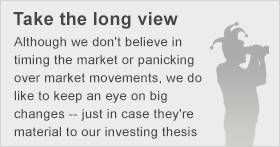
What: Shares of Endo International (ENDP +0.00%) ended the day down 11% after multiple media outlets reported that the company -- along with Johnson & Johnson (JNJ +2.61%) and Merck (MRK 1.21%) -- was asked by the U.S. Attorney's Office for the Southern District of New York for information about its contracts with pharmacy benefit managers. The much larger Johnson & Johnson only ended the day down 0.2%, and Merck ended down 0.7%.
So what: This isn't really new news -- at least not for Endo International -- Johnson & Johnson disclosed that it had received a civil investigative demand (CID) in an SEC document Tuesday, and Merck did the same on Monday.
But Endo International filed its 10-Q that disclosed the U.S. Attorney's request to its subsidiary, Endo Pharmaceuticals (EPI), about its migraine drug Frova last week, on May 6.
In March 2016, EPI received a CID from the U.S. Attorney's Office for the Southern District of New York. The CID requests documents and information regarding contracts with Pharmacy Benefit Managers regarding Frova.
Perhaps investors didn't notice because Endo's share price dropped more than 40% that day after management slashed its 2016 guidance.

Now what: It's not clear what the U.S. Attorney's beef is with Endo's, Johnson & Johnson's, and Merck's dealings with pharmacy benefit managers that act on the behalf of insurers to get the best price for medications. Pharmacy benefit managers and drugmakers have to skirt a fine line between negotiating price reductions and avoiding violating federal anti-kickback laws, although we're too early in the investigation to know if the companies have done anything wrong.
If the drugmakers are found in violation -- or they negotiate a settlement to make the problem go away -- there are usually financial penalties, typically because the government argues that the violation caused government-sponsored plans, such as Medicare, to overpay for the drugs.







